
May 14, 2013
Study of the mid-Atlantic deepwater canyons’ ecology and submerged history is no easy task; it requires a dedicated team of people and substantial resources to get scientists in a position to begin their work. Perhaps the most important element is the research vessel and its crew, in this case the NOAA Ship Ronald H. Brown and its NOAA Commissioned Corps Officers.
The NOAA Corps is a federal uniformed service (under the Department of Commerce) dedicated to producing officers to command the ships and aircraft used to conduct NOAA environmental and scientific operations. The Corps has projects occurring at sea, on land, and in the air, all over the globe. The officers generally have science backgrounds themselves, which aid them in their missions to facilitate the research being done.
The Ron Brown is the flagship of the NOAA fleet. It carries six NOAA Corps Officers, who lead an entire crew of roughly 30, including engineers, deck hands, stewards, survey technicians, and medical personnel. NOAA Corps Officers are responsible for managing all the ship’s systems—engineering, navigation, communication, hydrographic—and for ensuring the scientists on board can complete their work.
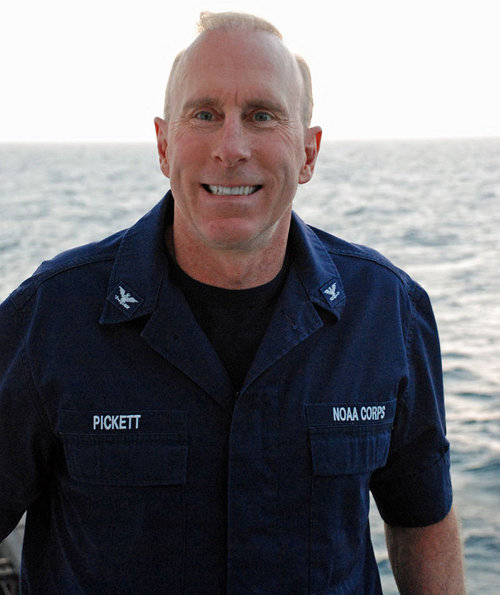
Image courtesy Deepwater Canyons 2013 - Pathways to the Abyss, NOAA-OER/BOEM/USGS. Download larger version (jpg, 425 KB).
What made you decide to join the NOAA Corps?
My father was an oceanographer for NOAA and we spent our family time on, in, and under the water. He encouraged a love of the ocean and motivated me to pursue a career that would nurture that love. I was also thrilled by adventure and travel, so with his recommendation, I joined the NOAA Corps.
What is unique or interesting about the NOAA Corps?
What I find most unique and interesting about the NOAA Corps is the opportunity to combine operational skills with scientific achievement. I'm a ship Captain, so I operate all sizes of research ships and small boats for NOAA. I'm also a trained scientist with a Ph.D. in oceanography so have a great interest in the ocean features that we study with our ships and boats.
What other assignments have you had in the NOAA Corps?
I've made nautical charts of Alaska and Hawaii for NOAA; worked at a fisheries research lab for NOAA; performed dives from Cape Town, South Africa, to Midway Island in the Pacific; and directed a ocean research division that studied the rich Bering Sea ecosystem, underwater volcanoes, and tsunami forecasting.
What type of person would you recommend the NOAA Corps to?
Someone who loves the ocean, loves adventure, and is willing to work harder and longer than any of their friends.
Executive Officer – Commander Liz Kretovic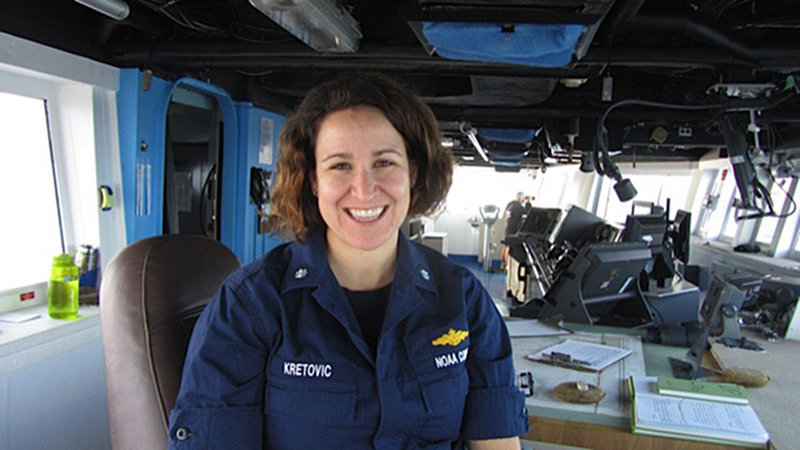
Image courtesy of Deepwater Canyons 2013 - Pathways to the Abyss, NOAA-OER/BOEM/USGS. Download larger version (jpg, 164 KB).
What made you decide to join the NOAA Corps?
When I think back to what the motivating factors were for joining the NOAA Corps, I can tell you this: As a high school student during the Exxon Valdez oil spill, I knew I wanted to do something to make a difference to protect the coasts and ocean. I went to the Massachusetts Maritime Academy and studied Marine Safety and Environmental Protection. I graduated in 1996 with a B.S. and promptly went to work in the environmental consulting industry.
Two years later, I felt I was on the wrong path and looked to bring my focus back to the marine environment. For me, the NOAA Corps was the just the right mix of what I wanted to do; it provided an opportunity to work aboard ships and also to work in the oil spill response field that I studied in college. I was commissioned as an Ensign in the NOAA Corps in 1999.
What is unique or interesting about the NOAA Corps?
My career has been filled adventure and opportunity. The best attribute of this job is reinventing myself everything two to three years with a different assignment in a different geographic location. My career began aboard the NOAA Ship David Starr Jordan which was based in San Diego, California, and I have worked from as far south as Peru and as far north as the California/Oregon border during the two years I was assigned there. In 2001, I transitioned to Silver Spring, Maryland, where I worked for the NOAA Restoration Center and also as the Flag Lieutenant for Rear Admiral Evelyn J. Fields.
What other assignments have you had in the NOAA Corps?
Currently, I am the Executive Officer aboard the Ronald H. Brown; I sailed here as Operations Officer from 2004-2007, as well. In between my stints on the Brown, I worked as the Scientific Support Coordinator for the Great Lakes and Upper Rivers providing support to the United States Coast Guard, Environmental Protection Agency, and other stakeholders during oil and chemical spills throughout the region. I had the honor of being the NOAA lead in the Mobile, Alabama, command post during the Deepwater Horizon oil spill.
What type of person would you recommend the NOAA Corps to?
I would recommend the NOAA Corps to anyone who has an adventurous spirit, is scientific minded, and has a passion for making a difference for future generations.
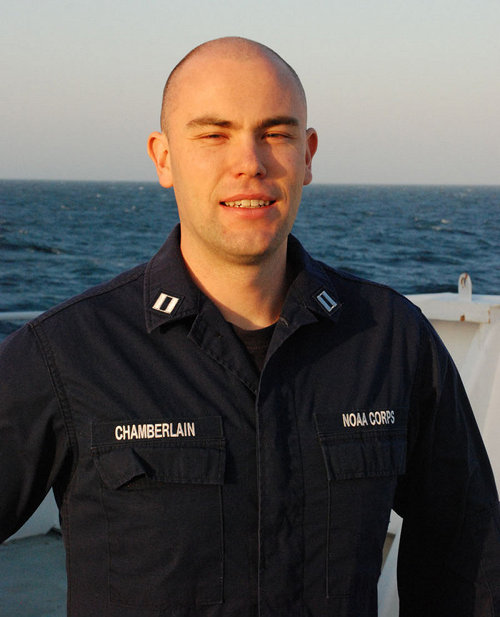
Image courtesy of Deepwater Canyons 2013 - Pathways to the Abyss, NOAA-OER/BOEM/USGS. Download larger version (jpg, 430 KB).
What made you decide to join the NOAA Corps?
The NOAA Corps was a happy accident. I was planning on going to graduate school after college, but learned about NOAA Corps at the last minute and changed my track. My dad was a Merchant Marine in the 1960s and I grew up on exciting stories from exotic places. I always had a desire to go to sea and be a part of scientific research. The NOAA Corps connected those dots beautifully.
What is unique or interesting about the NOAA Corps?
I get to drive a world-class, 274-foot research vessel every day. I work closely with a wide variety of top researchers to safely and efficiently execute cutting-edge scientific research operations. How many people get to say that?
What other assignments have you had in the NOAA Corps?
I was commissioned in 2006. Since then, I have been the Navigation Officer on the Ka'imimoana out of Hawaii, I was the Port Captain at the NOAA Marine Operation Center - Pacific, and I was a Scientific Support Officer at the NOAA Pacific Marine Environmental Laboratory in Seattle.
What type of person would you recommend the NOAA Corps to?
Someone who has a penchant for adventure and is committed to scientific research and discovery. Conducting scientific research at sea can be a lot of work and very frustrating. You need to have a passion for what you are doing out here to carry you through the hard times.
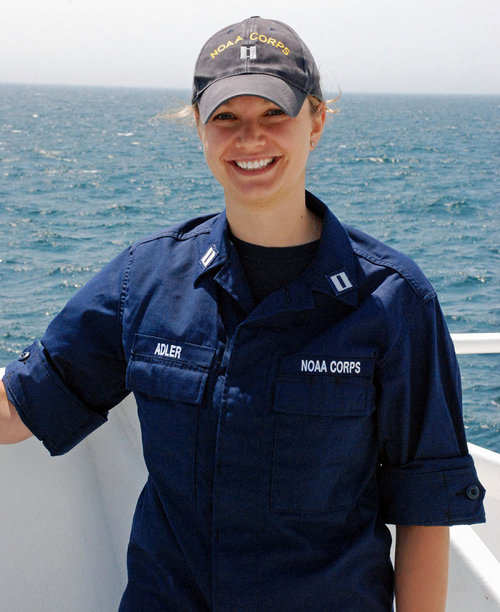
Image courtesy of Deepwater Canyons 2013 - Pathways to the Abyss, NOAA-OER/BOEM/USGS. Download larger version (jpg, 555 KB).
Lieutenant Madeleine Adler is the Field Operations Officer on NOAA’s newest hydrographic vessel, Ferdinand R. Hassler. She has a B.S. degree in environmental science from Bucknell University and an M.S. in atmospheric science from the University of Wyoming. LT Adler studied aboard the SS Universe Explorer through the University of Pittsburgh Semester at Sea program and knew she had found her calling that first week at sea.
LT Adler has been in the NOAA Corps for eight years and has a diverse background of assignments. Her career has ranged from Junior Officer on the NOAA ship Thomas Jefferson, Research Scientist at the Atlantic Oceanographic and Meteorological Laboratory, Flag Aide to the Admiral of NOAA Corps, and Deputy Director of the Project Management Division. Currently, she is augmenting as a qualified Bridge Officer and Medical Person in Charge on the NOAA Ship Ronald H. Brown for the Deepwater Canyons 2013 project.
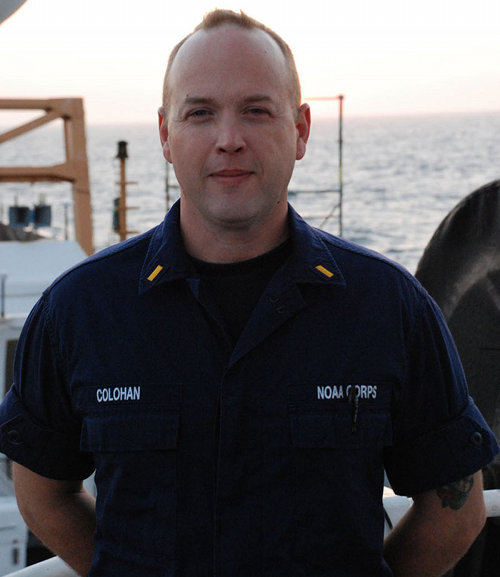
Image courtesy of Deepwater Canyons 2013 - Pathways to the Abyss, NOAA-OER/BOEM/USGS. Download larger version (jpg, 380 KB).
The foundations of my entering into the NOAA Corps were laid down the day I joined the U.S. Navy. I enlisted in the Navy when I was 20 and spent six years hunting submarines in the Pacific as a SONAR Technician. The last three years were spent overseas in Japan and my understanding of how the entire global community is affected by one another was formed. Upon leaving the Navy, I earned my B.S. in Anthropology and moved on to earn my M.S. in Environmental Science from Virginia Commonwealth University. I applied to the NOAA Corps to utilize my experience and education base for continued public service both to my country and the world.
I am currently the Navigation Officer aboard NOAA's Flagship the Ronald H. Brown, and I am participating in some of the most important scientific/environmental research being carried out today. We are some of the most select and diverse bridge officers in the world due to our fundamental understanding of the science and the safe navigation and operation of the vessel.
Having a job in the NOAA Corps is being placed in the position to do and be a part of things that very few people on the planet get to be a part of. The opportunity to travel and be on the cutting edge of environmental/oceanographic science makes the NOAA Corps a unique opportunity that is well worth the effort. The satisfaction of helping the global community, serving your country and knowing that your efforts contribute to something much larger that yourself is without equal.
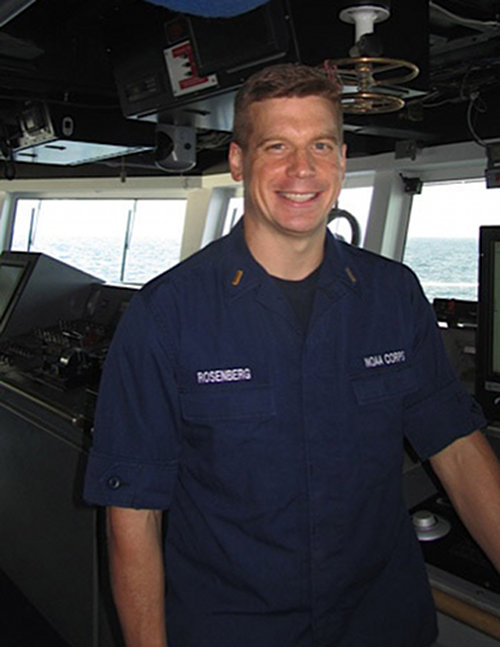
Image courtesy of Deepwater Canyons 2013 - Pathways to the Abyss, NOAA-OER/BOEM/USGS. Download larger version (jpg, 121 KB).
What made you decide to join the NOAA Corps?
As long as I can remember I have loved ships and the sea. I think my interest in finding a profession at sea was really kindled when, as a student in junior high school, I had the opportunity to be in a science class that was able to participate in some of the JASON Project’s first explorations that were broadcast real-time via satellite. I can clearly remember the excitement of seeing the images of wrecks and amphorae on the floor of the Mediterranean Sea as Dr. Robert Ballard explained the operation of the remotely operated vehicle. Later in life, when I realized that I could in fact participate in such explorations first-hand by joining the NOAA Corps, I jumped at the opportunity.
What is unique or interesting about the NOAA Corps?
What isn’t unique or interesting about this job? Earlier in this cruise, the scientists and the Jason Team discovered a new chemosynthetic community in the Norfolk Canyon. This cruise I have had the opportunity to become more proficient at operating the ship’s state-of-the-art dynamic positioning system. This week I was developing firefighting and damage control drills for the ship’s crew, and last week I was riding around in the fast rescue boat for a man overboard drill as the ship’s rescue swimmer. Earlier this year, I was at dive school to earn qualification as a NOAA diver. This summer, the crew of the Ronald H. Brown will take seawater samples across the Atlantic as part of an international research program into the global climate system. And I get to do all of this in the course of service to the nation.
What other assignments have you had in the NOAA Corps?
The Ronald H. Brown is my first assignment following graduation from the NOAA Corps Officer Training Center in New London, Connecticut, last December.
What type of person would you recommend the NOAA Corps to?
A prospective NOAA Corps Officer must foremost have a sincere interest in operating ships or aircrafts as a career. They must be willing to accept responsibility for ensuring the safety of scientists and shipmates in an inherently hazardous environment. A strong work ethic is an absolute necessity, as both initial training and operations within the NOAA Corps are very demanding. An ideal NOAA Corps candidate would have solid interpersonal skills to effectively work with NOAA’s partners at research institutions, the Armed Forces, state agencies, and other federal agencies. Someone who has a keen interest in marine and atmospheric science is going to find this career very rewarding.